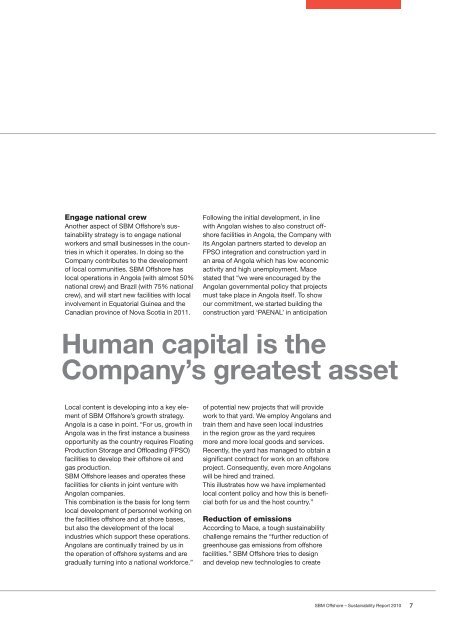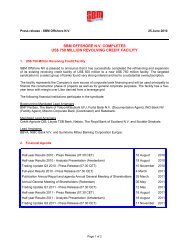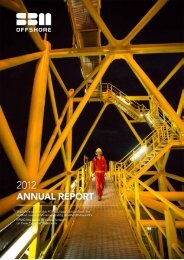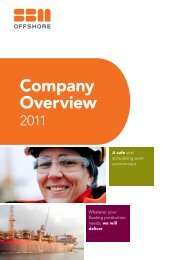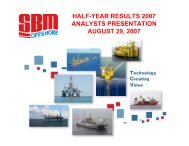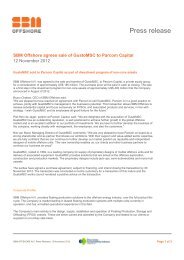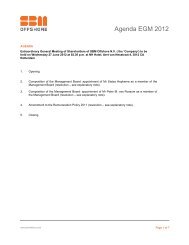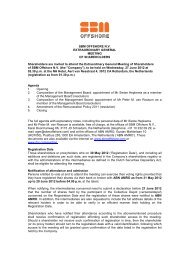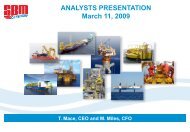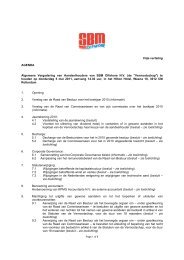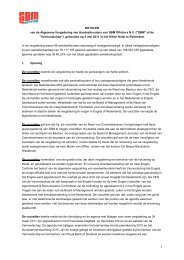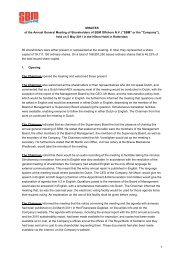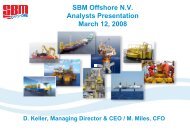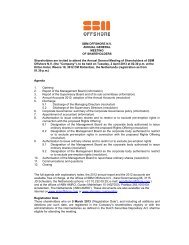Sustainability Report 2010 - SBM Offshore
Sustainability Report 2010 - SBM Offshore
Sustainability Report 2010 - SBM Offshore
You also want an ePaper? Increase the reach of your titles
YUMPU automatically turns print PDFs into web optimized ePapers that Google loves.
Engage national crew<br />
Another aspect of <strong>SBM</strong> <strong>Offshore</strong>’s sustainability<br />
strategy is to engage national<br />
workers and small businesses in the countries<br />
in which it operates. In doing so the<br />
Company contributes to the development<br />
of local communities. <strong>SBM</strong> <strong>Offshore</strong> has<br />
local operations in Angola (with almost 50%<br />
national crew) and Brazil (with 75% national<br />
crew), and will start new facilities with local<br />
involvement in Equatorial Guinea and the<br />
Canadian province of Nova Scotia in 2011.<br />
Following the initial development, in line<br />
with Angolan wishes to also construct offshore<br />
facilities in Angola, the Company with<br />
its Angolan partners started to develop an<br />
FPSO integration and construction yard in<br />
an area of Angola which has low economic<br />
activity and high unemployment. Mace<br />
stated that “we were encouraged by the<br />
Angolan governmental policy that projects<br />
must take place in Angola itself. To show<br />
our commitment, we started building the<br />
construction yard ‘PAENAL’ in anticipation<br />
Human capital is the<br />
Company’s greatest asset<br />
Local content is developing into a key element<br />
of <strong>SBM</strong> <strong>Offshore</strong>’s growth strategy.<br />
Angola is a case in point. “For us, growth in<br />
Angola was in the first instance a business<br />
opportunity as the country requires Floating<br />
Production Storage and Offloading (FPSO)<br />
facilities to develop their offshore oil and<br />
gas production.<br />
<strong>SBM</strong> <strong>Offshore</strong> leases and operates these<br />
facilities for clients in joint venture with<br />
Angolan companies.<br />
This combination is the basis for long term<br />
local development of personnel working on<br />
the facilities offshore and at shore bases,<br />
but also the development of the local<br />
industries which support these operations.<br />
Angolans are continually trained by us in<br />
the operation of offshore systems and are<br />
gradually turning into a national workforce.”<br />
of potential new projects that will provide<br />
work to that yard. We employ Angolans and<br />
train them and have seen local industries<br />
in the region grow as the yard requires<br />
more and more local goods and services.<br />
Recently, the yard has managed to obtain a<br />
significant contract for work on an offshore<br />
project. Consequently, even more Angolans<br />
will be hired and trained.<br />
This illustrates how we have implemented<br />
local content policy and how this is beneficial<br />
both for us and the host country.”<br />
Reduction of emissions<br />
According to Mace, a tough sustainability<br />
challenge remains the “further reduction of<br />
greenhouse gas emissions from offshore<br />
facilities.” <strong>SBM</strong> <strong>Offshore</strong> tries to design<br />
and develop new technologies to create<br />
<strong>SBM</strong> <strong>Offshore</strong> – <strong>Sustainability</strong> <strong>Report</strong> <strong>2010</strong> 7


